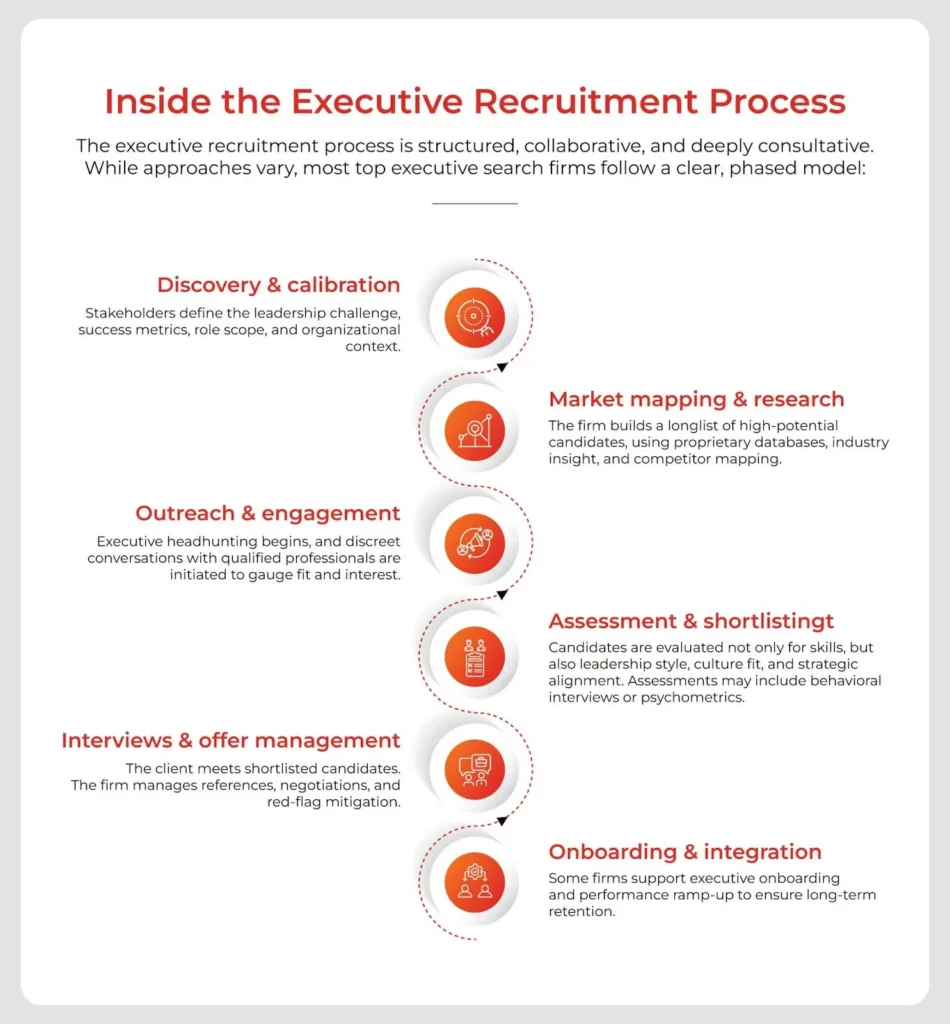An executive search firm is a specialized recruitment partner hired to find and place top-level leaders, typically for roles like CEO, CFO, CTO, and board members. These are not transactional hires. They’re business-critical decisions that shape strategy, culture, and performance for years to come.
That’s why job portals or traditional recruiters often fall short. The best candidates for these roles? They’re rarely applying anywhere. They’re usually heading teams at competing firms, not actively looking to move. Finding efficient leadership is among the top hiring challenges organizations face.
So if you’re asking, what is an executive search firm, think of it as a high-trust advisor for your most complex and high-stakes hiring. These firms craft an executive search strategy aligned with your business goals.
Why Companies Use Executive Search Firms
When it comes to leadership hiring, companies face a paradox: the more critical the role, the harder it is to fill through conventional means. Here’s why businesses across industries turn to executive recruiting firms:
- Access to passive talent: Top-performing executives rarely respond to job ads. They’re already leading elsewhere. Executive headhunting goes beyond databases, using targeted outreach and industry networks to engage high-impact leaders who aren’t actively looking but may be open to the right opportunity.
- Confidentiality: In executive hiring, certain situations demand absolute discretion, like replacing a current leader, managing a board transition, or exploring new market moves. Executive search firms operate under strict confidentiality protocols, allowing companies to assess and approach candidates without triggering internal unrest, external speculation, or reputational risk.
- Strategic alignment: Executive search firms partner with boards and CHROs to shape the leadership mandate, often refining the role based on current business needs. They bring market insight to adjust expectations around talent availability, compensation, and required capabilities. Instead of just backfilling a vacancy, they help define what kind of leader the business truly needs next, be it for turnaround, transformation, or succession.
- Speed with precision: Executive search may seem slower at first, but its structure eliminates noise early. By focusing only on high-fit candidates through rigorous vetting, firms reduce false starts and rework, accelerating final placement without sacrificing quality.
- Objective insight: External search partners bring market-wide perspective that internal teams often can’t access. They benchmark candidates not just on skills, but on leadership style, compensation trends, and readiness, grounding decisions in real-world data, not assumptions.
Learn how SPECTRAFORCE’s AI-driven Arya engine increases speed and candidate quality.
For mission-critical roles where the cost of a mis-hire is exponential, an executive search firm becomes a strategic extension of your leadership team.
Inside the Executive Recruitment Process
The executive recruitment process is structured, collaborative, and deeply consultative. While approaches vary, most top executive search firms follow a clear, phased model:

1. Discovery & calibration
Stakeholders define the leadership challenge, success metrics, role scope, and organizational context.
2. Market mapping & research
The firm builds a longlist of high-potential candidates, using proprietary databases, industry insight, and competitor mapping.
3. Outreach & engagement
Executive headhunting begins, and discreet conversations with qualified professionals are initiated to gauge fit and interest.
4. Assessment & shortlisting
Candidates are evaluated not only for skills, but also leadership style, culture fit, and strategic alignment. Assessments may include behavioral interviews or psychometrics.
5. Interviews & offer management
The client meets the shortlisted candidates. The firm manages references, negotiations, and red-flag mitigation.
6. Onboarding & integration
Some firms support executive onboarding and performance ramp-up to ensure long-term retention.
Executive search typically takes 6–12 weeks, though highly niche roles or misaligned expectations can extend the timeline.
How Executive Search Firms Deliver Strategic Value
A good hire can fuel growth. A bad one can derail it. According to SHRM, poor leadership hires can cost up to three times the executive’s salary. The upfront investment in an executive search firm helps reduce those losses and compounds ROI over time.
Here’s how:
- Reduced leadership turnover: Rigorous vetting dramatically reduces the risk of failure within the first 12–18 months.
- Better cultural fit: Executive recruiters look beyond resumes, factoring in alignment with vision, values, and team dynamics.
- Employer brand elevation: The way your opportunity is positioned with candidates (especially passive ones) impacts your perception in the market.
- Competitive intelligence: Market mapping reveals how competitors structure their teams, compensation, and succession pipelines.
- Succession planning: Many firms assist with building long-term talent pipelines, not just reactive hires.
How to Choose an Executive Search Firm
Choosing an executive search firm depends on several factors, including scope, industry, budget, and strategic goals.
What to evaluate:
- Domain expertise: Does the firm specialize in your industry or function? Generic search firms often lack the network depth needed for nuanced mandates.
- Process transparency: Reputable firms outline timelines, deliverables, and search methodology upfront.
- Track record: Ask about prior placements in similar roles, client retention rates, and candidate success stories.
- Candidate care: Remember, the firm represents your brand. Evaluate how they communicate with potential candidates.
- Value-added services: Some firms offer onboarding support, diversity hiring capabilities, or interim leadership solutions.
Choosing a firm is a strategic alignment. Before signing, clarify their retainer structure, exclusivity clauses, and fallback options.
When Should You Use an Executive Search Firm?
Engaging a search firm isn’t always necessary. But in certain situations, it becomes mission-critical:
- You’re filling a board, C-suite, or VP-level position with significant visibility or risk.
- You’ve tried internal and referral routes without traction.
- The role demands skills not readily available in your local market.
- Confidentiality is key for M&A, restructuring, or replacing existing leadership.
- You need leadership transformation, not just a replacement.
Bank On Executive Search When You Require Strategic Alignment
A strong leadership team defines your company’s future. That’s why executive search isn’t merely about speed or placement. It strategically aligns leadership capability and business vision.
When done right, the value of executive search compounds over the years and can be realized with improved performance, higher retention, faster pivots, and stronger teams.
If your next hire can make or break your growth strategy, a structured, discreet, and expert-led process is essential.
At SPECTRAFORCE, we approach executive recruitment as a partnership. Our team combines industry insight, behavioral science, and global reach to help you attract and retain transformative leaders.
Whether you’re preparing for succession, launching in new markets, or replacing a key executive, our approach balances speed with precision.
Explore our executive hiring services
FAQs
The role of executive search is to identify and recruit senior leadership talent who can impact an organization’s strategy, culture, and growth. It involves market mapping, confidential outreach, and in-depth assessment to ensure long-term fit.
Recruiters typically handle mid-level roles through volume sourcing. Executive search firms operate on retained agreements to fill critical leadership positions with deep market research and candidate vetting.
Executive search firms can reduce your hiring costs by filtering noise early and focusing only on high-fit candidates. They primarily do this by preventing wasted cycles. More importantly, they reduce the cost of bad hires, both financially and culturally.
Executive search firms improve the company’s employer brand by acting as brand ambassadors in discreet, high-level conversations. How they frame your vision, values, and challenges influences top candidates’ perceptions of your company.
Executive search firms find top-level candidates discreetly by using research-led headhunting.
Search consultants engage passive candidates through trusted networks, often without ever posting the role publicly. This approach ensures leadership transitions stay confidential, protecting both the organization and the candidate.



